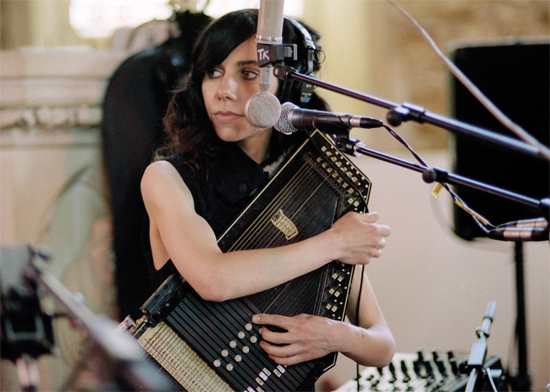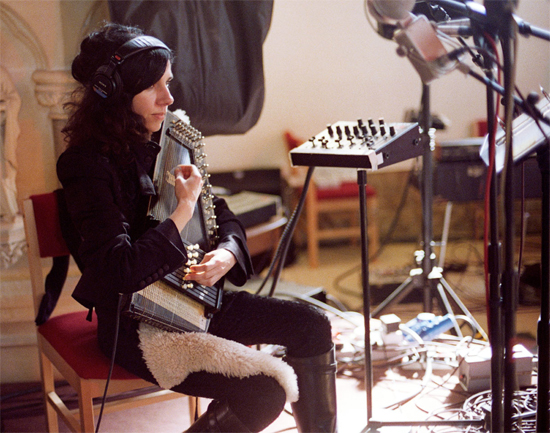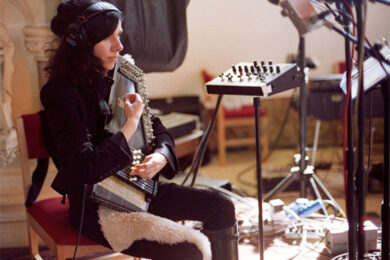It was probably pure coincidence that Polly Harvey chose Berlin for the live launch of her fiercely beautiful new album, Let England Shake, but there are resonances deep in her music and her new-found mood of geopolitical anger which strike a special chord in the German capital. Indeed, Harvey first tried to record her most political album to date here in Europe’s longstanding alternative Mecca for angry artists, street fighters and anti-war protesters. But she ultimately failed to find a comfortable space and eventually returned to her native Dorset.
Selling out two shows at a plush old Communist-relic theatre in bitingly cold February, Harvey draws a capacity crowd of older Berlin hipsters, Anglophiles and expats, ensuring this grungy corner of some foreign field remains forever England. Well, for two nights at least. And what a fantastically rich, ripe, dark, exotic, old, weird England Harvey drags onstage with her in Berlin, an invisible train of ghosts and echoes fanning out behind her magnificent white bridal gown.
An expansion on the virginal wraith ensemble she modelled for her last album, White Chalk, this dazzling outfit is Miss Havisham by way of Princess Leia, all topped off with a vaguely Native American crest of sculpted bird feathers. She makes a fantastically regal entrance, before standing stage right all night, separate from her small three-man band. Harvey spends much of this show cradling and stroking an Autoharp like a dying infant in a Victorian melodrama.
Much has been made by reviewers about how Let England Shake was recorded in a converted church overlooking the wave-lashed Dorset coast, a Thomas Hardy-esque narrative which plays into metropolitan fantasies about unspoilt country ways and magical folk wisdom. This all has a pleasing narrative symmetry, admittedly, but does not quite capture the complex tangle of love and pain, politics and poetry which Harvey has crammed into her post-modern protest album.
Great protest music tends towards simplistic sloganeering, theatrical anger, earnest expressions of solidarity. But Let England Shake is a real rare beast, a globalised state-of-the-nation address shot through with divided loyalties and rich literary roots. This complex, emotionally conflicted reflection on Englishness was recorded with an international band, all present in Berlin: Australia’s Mick Harvey on keyboards and bass guitar, French drummer Jean-Marc Butty, plus Harvey’s longterm musical soul mate John Parrish on guitars and more.
Huddled around a cluster of mostly acoustic and vintage-looking instruments, this low-key trio leave the emotional histrionics to Harvey. But the virtuoso sound paintings they muster are full of drama, layered with grainy avant-folk textures and jazzoid music-box rhythms, all wreathed in warm analogue fuzz. With marching-band drums and sampled trombones, they evoke a sepia-tinted Olde England of brass bands, fairgrounds and country fayres. In sober tunics and sombre waistcoats, they look and sound like a steam-powered Radiohead. All they lack is Edwardian military whiskers.
Harvey’s heartbroken homesick blues are immediately evident from the album’s title track, which rattles and clangs this show into life, a shrill memorial to a fantasy Albion of idyllic lakes and fluttering birds ominously silenced by the gathering storm clouds of war. This deceptively jaunty mix of good-time hoe-down rhythms and gothic horror rolls on into the ‘The Words That Maketh Murder’, with Harvey channelling an unnamed soldier’s yearning for home while describing battlefield butchery in queasy, visceral detail.

Of course, these dystopian jigs and reels are not narrowly concerned with pastoral England but with a century of British colonial misadventures, drawing a fatalistic bloodline from the catastrophic Gallipoli campaign in 1916 to modern-day Iraq and Afghanistan. Which helps explain the spooked sample of a Kurdish love song woven into ‘England’, an inspired melding of folk cultures, and the rolling refrain from Niney’s vintage Trojan reggae tune ‘Blood and Fire’ embedded in the shimmering snake-charmer groove of ‘Written on the Forehead’, which Harvey coos uncertainly in Berlin over a stuttering phased guitar. Spine-tingling in a classic Liz Fraser way, this deceptively languid depiction of a hellish Middle Eastern war zone is one of the strangest and most spellbinding songs she has yet written.
When I met Harvey in the late 1990s, she confessed to being unworldly and broadly apolitical, risking the wrath of metropolitan liberals with her support for fox-hunting. She has clearly become more overtly angry and engaged since then, citing Harold Pinter and Ken Loach as key influences on Let England Shake. But the album’s anti-war subtext is more humane and nuanced than stridently polemical, on a par with Radiohead’s graceful symphonic homage to World War I veteran Harry Patch, or Steve McQueen’s proposal to commemorate British serviceman killed in Iraq on postage stamps. Bizarrely, this new-found taste for social comment has now led to Harvey being put forward for a potential post as an official war artist.
Besides Pinter’s fractious poetry and Loach’s celluloid sermons, Harvey also cites the war paintings of Dali and Goya, the films of Stanley Kubrick, TS Eliot’s ‘The Waste Land’ and others as cultural ancestors to Let England Shake. To this crowded hinterland we might easily add the Great War poets Wilfred Owen and Siegfried Sassoon, Joan Littlewood’s Oh! What A Lovely War, a dash of John Osborne and Philip Larkin, and even The Queen Is Dead by The Smiths. An army of disappointed romantics, Anglophile outsiders, resentful lovers of their inescapable homeland.
Much of the emotional bite of these anti-national anthems lies in their unresolved, possibly irresolvable tension between feelings love and hate, alienation and belonging. In Berlin, Harvey sings of her far-off home in terms of damp filth and drunken beatings, its poisoned fields no longer yielding corn crops but bitter wartime harvests of orphaned and deformed children. A neat twist on an ancient theme: ploughshares into swords. At the heart of a German city once reduced to rubble by Allied bombs, these words carry an extra chill. And yet one of tonight’s rousing peaks is the wheezing ballad simply titled ‘England’, streaked with tears of disappointment but closing with a passionate declaration of "undaunted, never-failing love" for the shabby old ruin. Patriotism? Nostalgia? Bonds of blood and soil? It’s complicated.
Harvey would probably never apply this overused, oft-abused term to her work, but there also is a hint of psychogeography about Let England Shake, notably the poetic re-imagining of landscapes as overlapping texts embedded with literary, historical and political echoes. It is there in the sardonically jaunty hoedown ‘This Glorious Land’ and the simply gorgeous ‘On Battleship Hill’, a true forget-to-breathe highlight in Berlin, in which the blood and bones of past tragedies literally become part of the living earth. If only all protest songs sounded this arrestingly dramatic, like ‘Ghost Riders In The Sky’ orchestrated by Ennio Morricone.
Besides a slender handful of older tunes, Harvey pays little heed to her androgyne archive of scouring blues-punk in Berlin, sticking mostly within her upper vocal register and her more recent folk-rock siren persona. She closes with ‘Silence’ from White Chalk, a lovely scream of unrequited love, which simply underlines how personal and political passion can occupy the same emotional space for great songwriters. Another empty English landscape stained with grief, loss and heartbreak. All is unfair in love and war.
After the show, 50 metres from the theatre, I find a flashing neon sign reflected in the cracked-ice surface of Berlin’s river Spree. "Capitalism Kills Love" it proclaims, again and again and again. How effective protest art can be when shrunk to seductively simple slogans. But how much less potent than disturbingly beautiful, blood-stained, flag-waving songs which prick your conscience and pierce your heart.



